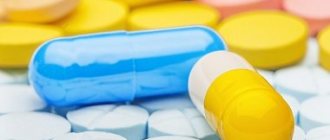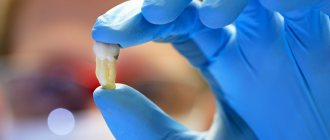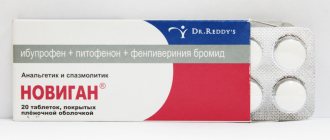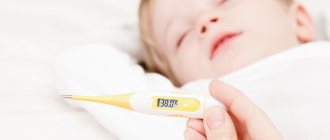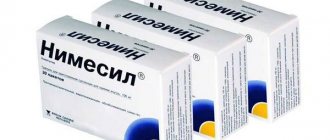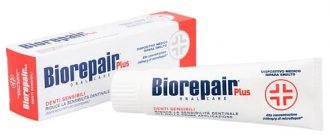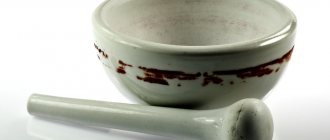What to do if your child has a fever? This question sooner or later arises in every parent who is concerned about the health of their child. But not all mothers and fathers know what temperature can and should be lowered. So, for example, in newborns and babies up to one year old the indicator is up to 37.5-38 degrees, which for us adults is considered elevated, and is the norm. The baby is one month old – does he have a fever? Reduce it only if it rises above 38-38.5.
As for older toddlers, for them this “threshold” is 39-39.5. If the thermometer shows a lower temperature, you should not knock it down. Remember that a child’s fever is an excellent opportunity for the body to fight the infection on its own. Give your baby the opportunity to boost his immunity!
Side effects
When using the drug, the following side effects are rarely possible:
From the gastrointestinal tract: nausea, vomiting, discomfort or pain in the epigastrium, laxative effect, the occurrence of erosive and ulcerative lesions, bleeding.
From the nervous system: headache, dizziness, psychomotor agitation, insomnia.
From the hematopoietic organs: anemia, thrombocytopenia, agranulocytosis, leukopenia.
From the urinary system: impaired renal function, cystitis.
Allergic reactions: skin rash, itching, urticaria, exacerbation of bronchial asthma, angioedema, anaphylactoid reactions, anaphylactic shock, bronchospasm, fever, erythema multiforme exudative (including Stevens-Johnson syndrome), toxic epidermal necrolysis (Lyell's syndrome).
From the cardiovascular system: tachycardia, increased blood pressure.
What is Nurofen?
Nurofen is a medication from the group of non-steroidal anti-inflammatory drugs (NSAIDs), which is a derivative of phenylpropionic acid. It reduces the production of hormone-like substances - prostaglandins in the body, due to which it reduces pain at the site of inflammation, eliminates inflammatory processes, and also relieves fever (fever) no less effectively. Nurofen has an immunomodulatory effect (regulates or normalizes the functioning of the immune system), stimulating the formation of endogenous interferon (blood proteins secreted by the body's cells in response to the invasion of the virus), and increases nonspecific resistance (the body's resistance to the effects of various factors) of the body.
Nurofen is used to reduce fever and also as an analgesic and anti-inflammatory agent. Helps with headaches, toothaches, arthritis, back pain, menstrual pain in women, osteoarthritis, as well as pain from kidney stones or to reduce pain from minor injuries.
Directions for use and doses
Rectally. The dosage for children depends on the age and body weight of the child.
Post-immunization fever: children under 1 year - 1 supp., over 1 year, if necessary, 1 more supp. in 6 hours
Fever and pain
Single dose - 5-10 mg/kg body weight 3-4 times a day. The maximum daily dose is no more than 30 mg/kg/day.
Children aged 3–9 months (5.5–8.0 kg) - 1 supp. (60 mg) 3 times within 24 hours every 6–8 hours, not more than 180 mg/day; from 9 months to 2 years (8.0–12.5 kg) - 1 sup. (60 mg) 4 times within 24 hours every 6 hours, but not more than 240 mg/day.
Duration of treatment: as an antipyretic - no more than 3 days; as a pain reliever - no more than 5 days.
If fever persists, you should consult your doctor.
Is it necessary to bring down a child’s temperature to 36.6?
If, after using antipyretics, the readings decrease by 0.5°C within an hour, then the process is normal. Do not aim to reach 36.6°C immediately. This can cause serious overload of the child’s body, which can lead to a deterioration in overall well-being.
The ideal temperature would be 37-37.5 degrees. After some time, a jump may occur again. This occurs because the active component of the medicine is excreted from the body and ceases its effect. If several hours have passed after taking the drug, you can give the child another dose. It is very important to observe time intervals between doses and monitor temperature readings.
With an effective fight of the immune system against pathogenic microbes and with a competent approach to treatment, recovery, as a rule, is 3-5 days.
What should you not do while taking Nurofen?
Be careful!
While taking Nurofen, drinking alcohol is prohibited. Taking alcoholic beverages and this drug together increases the risk of gastric bleeding.
You should also avoid taking aspirin at the same time while taking Nurofen, as the combination of these drugs can cause a stroke or heart attack. Aspirin is often used in the treatment of cardiovascular diseases, and Nurofen reduces its effectiveness.
If you need to use both drugs, take Nurofen at least 8 hours before or 30 minutes after taking aspirin if the aspirin is in a form without a gastro-resistant coating.
Before using any cold, allergy, or pain medicine, consult your doctor or pharmacist. Many over-the-counter medications contain aspirin or other NSAIDs. Taking some medications together can lead to an overdose and serious side effects. Read the instructions carefully to find out if the medicine contains aspirin, ibuprofen, paracetamol or other NSAIDs.
Abdominal pain associated with pathology of the gastrointestinal tract.
Acute abdomen is a state of catastrophe in the abdomen, characterized by severe pain, barely bearable, constant, aching or frequently recurring. This condition requires immediate medical attention!!! This picture is caused by appendicitis, cholecystitis, pancreatitis, suppuration of an ovarian cyst, bleeding into the abdominal cavity, intestinal obstruction, intussusception, peritonitis, and perforated gastric ulcer.
Alarm signals:
- Severe pain, the child cries and/or squirms;
- Persistence of pain for 2-4 hours, and even more so its increase;
- Feeling unwell, cold sweat, fainting;
- Confusion.
Before the doctor arrives, put the child to bed, do not disturb him or try to give him anything to eat or drink. REMEMBER: you cannot give painkillers (analgin, nurofen, paracetamol, efferalgan), offer the child a heating pad, an ice pack, laxatives, try to give an enema, all this can lead to a worsening of the child’s condition and, as they say, “blur the clinical picture,” thereby delay timely diagnosis and timely prescribed treatment.
Gastritis, stomach ulcer, gastroesophageal reflux. Gastritis is an inflammatory disease of the stomach wall, characterized by abdominal pain and dyspeptic disorders.
The etiological factor is often Helicobacter pylori infection.
Emotional lability (conflicts in the family, school, some kind of disaster, stressful situations), malnutrition, allergic processes predispose to the development of gastritis - all this leads to an increase in the acidity of gastric juice and creates favorable conditions for infection with the microbe Helicobacter pyloricus.
Most often, the pain syndrome is accompanied by dyspeptic disorders (nausea, belching, unstable stool, constipation). An important symptom is liver enlargement associated with stagnation of bile.
There are no symptoms of chronic intoxication and changes in other organs. Physical development corresponds to age. In some children, the main symptoms of the disease are liver enlargement without pain.
A good effect for improving well-being is provided by excluding too fatty, spicy, fried foods from the diet. The same applies to baked goods. Vegetable oil, on the contrary, increases bile secretion and is recommended to be consumed more often. If, in addition to the specified diet, you increase physical activity, this is often enough for recovery and well-being.
If diet and lifestyle changes are not enough, choleretic agents are used. Your doctor should recommend specific medications.
Enteritis, colitis (enterocolitis) is an inflammatory disease of the wall of the small and large intestines, characterized by abdominal pain and diarrhea syndrome.
Chronic colitis and enterocolitis are most often associated with acute infections. In this case, the pathogen that caused the disease has already lost its significance, and the dysfunction of the intestine is supported by those morphological changes that remain after the infection.
Pharmacological properties of the drug Nurofen™ for children
The mechanism of action is due to inhibition of the synthesis of prostaglandins - mediators of pain, inflammation and temperature response. The drug has analgesic, antipyretic and anti-inflammatory effects, inhibits platelet aggregation. After oral administration, it is quickly and almost completely absorbed from the digestive tract. The maximum concentration of the active substance in the blood plasma is achieved 1–2 hours after administration. Ibuprofen is 90–99% bound to plasma proteins and penetrates into the synovial fluid. Metabolized in the liver to two inactive metabolites, which are quickly and almost completely excreted by the kidneys. A certain amount (10%) is excreted unchanged. The half-life is 2 hours.
What are the side effects of Nurofen?
Common side effects of Nurofen are:
- upset stomach, mild heartburn, nausea, vomiting;
- bloating, gas, diarrhea, constipation;
- dizziness, headache, nervousness;
- decreased appetite;
- mild itching or rash;
- tinnitus.
In individual cases, the list of side effects can be much wider. Ask your doctor about individual sensitivity.
Allergic reactions to Nurofen include the following symptoms:
- rash;
- hives;
- sneezing;
- runny or stuffy nose;
- wheezing or difficulty breathing;
- swelling of the face, lips, tongue, or throat.
If you have one or more of the above symptoms as a result of an allergic reaction to Nurofen, you should immediately contact an ambulance for symptomatic treatment.
Consequences of an overdose of Nurofen
When taking too high a dose of Nurofen, various overdose symptoms may occur, which may result in the following health consequences :
- heart attack;
- heart failure;
- anemia (anemia);
- stomach and/or intestinal bleeding;
- the appearance of through holes in the gastrointestinal tract (perforation);
- inflammatory liver diseases (hepatitis);
- renal failure;
- bronchial asthma.
Therefore, it is extremely important not to exceed the daily dose of this drug, carefully study the instructions for the drug and not neglect the doctor’s recommendations.
What you need to know before you start taking Nurofen
Nurofen should not be taken if you have heart disease, or before or after surgery on the cardiovascular system.
The drug should be taken with caution by older people, as there is a risk of gastric and intestinal bleeding.
If you have a confirmed allergy to Nurofen or have a history of an asthma attack, hives or a severe allergic reaction after taking medications such as aspirin, paracetamol or other NSAIDs (non-steroidal anti-inflammatory drugs), you should avoid using Nurofen as it may cross allergic reaction (the occurrence of an immune response to allergenic molecules that are similar in structure and function and are found in various organic products).
Consult your doctor about the safety of using Nurofen individually for you if you have the following conditions:
- heart disease (congestive heart failure, cerebrovascular disease, arterial hypertension, coronary heart disease, dyslipidemia/hyperlipidemia (abnormally elevated levels of lipids and/or lipoproteins in human blood));
- diabetes;
- smoking;
- history of heart attack, stroke;
- history of stomach ulcer or gastrointestinal bleeding;
- asthma;
- liver or kidney diseases;
- swelling due to fluid retention in the body;
- connective tissue diseases such as Marfan syndrome, Sjögren's syndrome or systemic lupus erythematosus.
Taking Nurofen during the third trimester of pregnancy may cause harm to the fetus. Pregnant women should not take this medicine without consulting a doctor.
It is not known whether Nurofen passes into breast milk, so the risk of effects on a nursing infant cannot be ruled out. Consult your doctor before using the drug. Stop breastfeeding while you are taking the medicine.
Although Nurofen for Children (suspension) can be given to children from 6 months of age, do not give the medicine to a child under 2 years of age on your own without consulting a doctor.
Interaction of Nurofen with other drugs and substances
Check with your doctor before using Nurofen if you are taking antidepressants, as taking these medications with NSAIDs may cause minor bleeding or bruising.
Ask your doctor if it is safe for you to use Nurofen if you are taking any of the following drugs:
- cyclosporine (immunosuppressant);
- pemetrexed (anticancer drug);
- lithium;
- methotrexate (cytostatic drug against tumors);
- anticoagulants (blood thinners (Warfarin, Coumadin, Jantoven));
- antihypertensive drugs (lowering high blood pressure);
- steroid medications (eg Prednisone).
This list is not complete. Some other drugs may also interact with Nurofen, including prescription and over-the-counter medicines, vitamins, and herbal products. Not all possible interactions are listed in this medication guide.
Inorganic causes of abdominal pain.
Functional pain (colic in infants). Colic is paroxysmal pain in the abdomen, during which a child during the first 4 months of life screams loudly and “kicks” his legs. Colic occurs suddenly, the cry is loud and prolonged, the child’s face turns red, sometimes the feet become cold, and the hands are clenched into fists. The attack may end when the child is completely exhausted or after the passage of feces or gases.
Colic is most often caused by immaturity of the gastrointestinal tract. May be associated with errors in the diet of a nursing mother (dairy products, vegetables, nuts, coffee, grapes, etc.). Sometimes it is caused by the baby overeating or swallowing air during feeding. And sometimes, the causes of colic are more serious, for example, lactase deficiency leads to impaired digestion of milk sugar and causes increased fermentation of carbohydrates in the gastrointestinal tract. The development of intestinal dysbiosis, manifested by an increased growth of opportunistic flora and a decrease in normal microflora, leads to a violation processes of food digestion and also to increased fermentation processes in the intestines.
To prevent intestinal colic, a nursing mother must first of all follow a diet, completely excluding from the diet those foods that can lead to indigestion in the baby. Your pediatrician will tell you more about the diet. It is imperative that after feeding, and sometimes during feeding, the baby must be held vertically (“in a column”) to remove excess air that is swallowed during eating. If an attack of colic does occur in the baby, then the crying child should be picked up, pressed with his back to you, legs bent. Another option is to place him on your lap, tummy down. You can additionally place an ironed warm diaper under your stomach. A massage gives a good effect - stroking the tummy clockwise and using carminatives (dill water, plantex, etc.), you can use the installation of a gas outlet tube, all these activities help to release gases and stop colic and calm the baby.
To prevent colic or if the latter is caused by serious reasons, it is possible to prescribe drug therapy; your pediatrician will tell you what medications to give your baby in this case.
In any case, during an attack, especially the first one, the following diseases should be excluded:
- The presence of a tumor in the groin (strangulated hernia);
- Abdominal tension, pain, vomiting (“acute abdomen”).
Retention of stool for more than 1 day, blood in the stool (intestinal obstruction). In this case, an examination by a pediatrician, and sometimes a surgeon, is simply necessary.
It must be remembered that the child is examined by a pediatrician in the first month of life weekly, starting from the second month once every 14 days, then monthly. An examination by a surgeon is carried out in the first, third month of life and at 1 year, if there are no indications for more frequent consultations.
Alarm signals:
- Increased frequency and intensification of pain;
- Weight loss;
- Vomiting blood or coffee grounds.
In the treatment of gastritis and peptic ulcers, regular nutrition without overeating, the exclusion of irritating foods, the use of boiled, baked or lightly fried low-fat second courses, light dinners at least 2-3 hours before bedtime, the exclusion of sour juices and sweets are of great importance. The doctor prescribes an examination, diet and appropriate medications.
Diseases of the biliary system. Diseases of the biliary system in children, as a rule, are of microbial origin. Predisposing factors are a violation of the outflow of bile, which develops with dyskinesia of the biliary system.
Dyskenesia may be associated with dysfunction of the sphincter apparatus, blockage of the ducts or their compression. Subsequently, the presence of an inflammatory process in the ducts may be accompanied by a violation of the outflow of bile.
The contractility of the gallbladder is important.
The pain syndrome is usually accompanied by dyspeptic disorders (nausea, belching, unstable stool, constipation). An important symptom is liver enlargement associated with stagnation of bile.
There are no symptoms of chronic intoxication and changes in other organs. Physical development corresponds to age. In some children, the main symptoms of the disease are liver enlargement without pain.
A good effect for improving well-being is provided by excluding too fatty, spicy, fried foods from the diet. The same applies to baked goods. Vegetable oil, on the contrary, increases bile secretion and is recommended to be consumed more often. If, in addition to the specified diet, you increase physical activity, this is often enough for recovery and well-being.
If diet and lifestyle changes are not enough, choleretic agents are used. Your doctor should recommend specific medications.
Enteritis, colitis (enterocolitis) is an inflammatory disease of the wall of the small and large intestines, characterized by abdominal pain and diarrhea syndrome.
Chronic colitis and enterocolitis are most often associated with acute infections. In this case, the pathogen that caused the disease has already lost its significance, and the dysfunction of the intestine is supported by those morphological changes that remain after the infection.
The main clinical symptoms are abdominal pain, bloating and rumbling, impaired intestinal motility (constipation, diarrhea, or diarrhea alternating with constipation). Pain may be absent during the period of remission of the disease, but dysfunction of the intestines remains, which requires restorative treatment.
In addition, increased irritability, tearfulness, depressed mood, vascular dystonia syndrome, and a tendency to smooth muscle spasms are typical for these patients.
Rehabilitation consists of organizing nutrition according to the ability to absorb food, psychotherapy, the use of physiotherapeutic influences, and the use of astringents, enveloping, and absorbent agents. Recommendations on nutrition, daily routine, and medications can only be given by a doctor.
Symptoms of an overdose of Nurofen
You should immediately stop using Nurofen and consult a doctor immediately if you experience the following symptoms that may indicate an overdose of this drug:
- changes in vision (decreased clarity, distorted colors);
- shortness of breath (even with light exertion);
- swelling of the body or rapid weight gain;
- the first sign of any skin rash, no matter how mild;
- signs of stomach bleeding - bloody or tarry stools, coughing up blood, or vomit that looks like coffee grounds;
- evidence of liver problems - nausea, pain in the upper abdomen, feeling tired, loss of appetite, dark urine, clay-colored stools, jaundice (yellowing of the skin or eyes);
- signs of kidney problems - infrequent, little or no urination, painful or difficult urination, swelling of the legs or ankles, feeling tired or short of breath;
- low red blood cell count (anemia)—pale skin, dizziness or shortness of breath, fast heartbeat, trouble concentrating;
- for severe skin and mucous membrane reactions—fever, sore throat, swelling of the face or tongue, burning eyes, skin tenderness, followed by a red or purple skin rash that spreads, especially to the face or upper body, and causes blistering and peeling.
